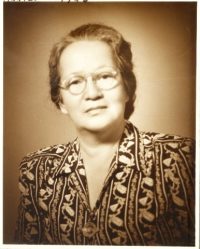Various groups of persons have left us–with reason. We had gotten so crowded that a person lying down could not even stretch his legs. My two brothers and their families had moved to nearby houses that were still fairly intact. Don Manuel Vicencio del Rosario, a judge of the court of first instance, remained in his home, next to the Paco fire station, for a change in the direction of the wind had saved the house from the holocaust. Don Manuel had a large bombproof dug out in his garden, where he could hide if necessary. He came over to invite us to stay with him, saying that he had eight beds at our disposal.
When the bombing resumed in the afternoon I hid under the thick wooden dining room table of the judge, together with my sister, granddaughter, in-laws and the Zaragoza couple. Don Manuel and his son Manoling, a Mr. Rojo and his two sons Joaquin and Luis, and Paco Marin and his wife ran to the shelter for refuge. Suddenly we heard shouts and rifle shots in the neighboring garden. 1 peeped outside our window and saw a group of armed Japanese climbing over the garage of Col. Telesforo Martinez, the pre-war deputy chief of the Constabulary. Who can understand the abnormal mentality of the Japanese? While to the refugees the Japanese were giving rice, next door they had just committed the most terrible of crimes – the killing of a dozen innocent and defenseless men. Deaf to pleas and uttering only the words guerriya, guerriya, they had ordered all the women inside the house. They had taken all the men outside, lined them up against the wall and massacred them all with rapid gunfire – the young and the old, the masters and the servants. Fortunately, not all perished. Ernesto Lagdameo and Juan Lao, wounded and bleeding, managed to survive.
We quickly went next door after be. the enemy had left. We found Ramón Zaragosa with his head blown open and Judge Del Rosario and his son dead. We found the Rico children, their father, Colonel Martinez d and his son—and there was Paco Marin bleeding, his intestines dangling. Paco asked his wife to kill him—he could no longer stand the agony. To think that just a few moments ago these cadavers were strong and healthy men, enjoying lifel What a terrible proof the Japanese had just given us of their “great benevolence and magnanimity!”
Enemy soldiers stationed themselves at the entrance to burning houses. They fired on anyone who came out of the doors, regardless of sex or age, even those who were trying to put out the fire.
The houses everywhere were burning. Where were we to take refuge? The entire block on Padre Faura Street was an inferno. I prayed: Where, oh, Lord, can we go? How much time, oh, Lord, do we have of life? From the bottom of my heart I prayed: “Lord, Lord, let everything burn if that is your wish, but protect us, save us from death.”
We tried to run to the General Hospital, but we stopped in Oregon Street. Japanese patrols were ordering the civilians to put up their hands. They were pushing them into a wooden house with rickety stairs. What were they planning to do with us? Were they going to burn us alive? could hear the advice of the Rico brother before they were killed: “Resist! Resist!” But with what? We did not have a knife, not even a stick, with which to fight back.
A woman who knew Nippongo spoke to a Japanese officer after bending herself double. What did she say; What did they talk about? The soldiers hurriedly pushed us along and most of us had to abandon our sacks of clothes, canned goods and even jewelry and money. They tried to bring us to the Philippine General Hospital, but we all had to stop on Oregon street, for the rifle and machine-gun fire was almost continuous. Some of the refugees joined us, among them Judge Félix Bautista and his family, the Luis Castillos and their children.
We spent a horrible night—we were sleepless, hungry and almost deaf from the continuous bombardment. Enemy snipers fired at us from trees, but they did little harm, for they were poor marksmen. Just before dawn I was able to doze off for an hour.
